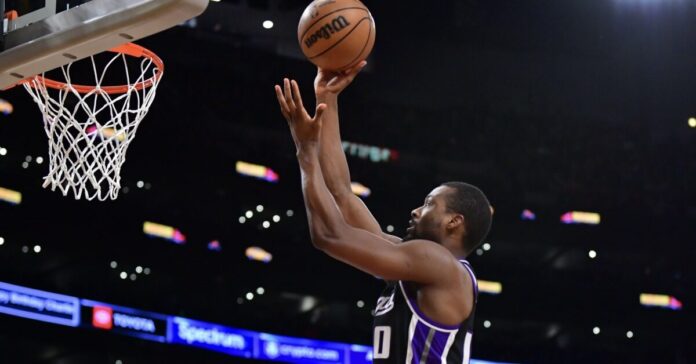Harrison Barnes has been with the Sacramento Kings longer than anyone else on the team aside from De’Aaron Fox. He’s played more games in a Kings uniform than Chris Webber, Bobby Jackson and Doug Christie, and started every single one he’s suited up for. He’s 6th in Sac-era history in 3 pointers made and 9th in points. Yet over there years there might not be a player on the Kings who has been bandied about more in potential trade discussions among fans, or who gets more vitriol when he underperforms.
It wasn’t so long ago that the phrase “but can he play SF” was a meme among Kings fans who had been searching for a quality starting Small Forward for years before finally finding one in first Rudy Gay and then Harrison Barnes. Barnes was acquired for essentially free in one of Vlade Divac’s rare trade heists for his tenure; For the low, low price of Zach Randolph and Justin Jackson, the Kings got a starting Small Forward and a veteran leader for a young group. The risk lay in if the Kings could re-sign him, and they did, not just once, but twice, as they inked him to a new three year, $54 million deal last summer after four seasons of solid, if unspectacular, play.
Barnes proceeded to have statistically the worst season of his Kings tenure this year after signing his latest deal, averaging just 12.2 points with 3 rebounds and 1.2 assists. He also posted the worst net rating of any Kings rotation player at -7.8, with the Kings being better on both ends of the floor when he was off the court.
Part of this declining performance was likely by design however. With Keegan Murray now aboard, Coach Brown and co. drew up a lot of plays for Murray and relegated Barnes to essentially play a role as a spot-up shooter, rarely if ever calling specific plays for him. In seasons past, Barnes would have his number called as both a driver and post-up player, and those touches were now instead going to Murray. Barnes saw his attempts at the rim drop in frequency by almost 8%, and his Free Throw Attempt rate fall from 52.2% last season (the most of anyone on the team) to just 26.8% this season. 52.6% of his total attempts came from beyond the arc, the highest rate of his career.
Barnes’ biggest games of the season all came when he got wildly hot from distance. A 39 point performance against the Warriors saw him go 7-12 from distance, and he only had two games where he scored 17 or more points and didn’t hit more than one three. Unfortunately there were just too many games where Barnes disappeared when the three point shot wasn’t falling, and the Kings usually lost as a result. Barnes’ shooting efficiency difference between wins and losses was staggering: In Kings wins, Barnes shot 50.9% from the field and 43.6% from three (for comparison Steph Curry shot 40.8% from three this year). But in losses, Barnes shot just 42% from the field and 30.9% from three. This “live by the three, die by the three” mentality was a problem for the Kings in general, but no player epitomized this more than Barnes this season.
Barnes also doesn’t provide a ton in other areas to make up for a lack of scoring. Defensively, he tries, and often is given defensive assignments way above his paygrade simply because the Kings have so few options upfront, but he doesn’t possess the length or athleticism to be a true plus defender, and this is becoming worse with age as he has slowed down in recent years. While never a great rebounder, this season he only pulled down 3 a game, his lowest total of his career by far. Part of that is playing next to a rebounding machine in Domantas Sabonis, but even still, you expect more than 3 rebounds a game from a frontcourt player who plays as often as Barnes does.
Barnes can still be an effective player for the Kings, and by all accounts is an excellent teammate. But it seems clear at this point in his career that the Kings need an upgrade in the frontcourt, especially in the starting lineup, and Barnes is the odd man out with both Domantas Sabonis and Keegan Murray secure in their rotation spots. As a bench player, Barnes could potentially thrive with more energy to come in and have some plays run for him as a primary scorer. But Barnes’ contract also makes him the most likely piece to be moved in order to create that potential upgrade in the frontcourt. It seems an unlikely scenario that the Kings would be able to acquire a replacement frontcourt starter for Barnes while retaining Barnes on the team.
Harrison Barnes has been a model Sacramento King, and will always be remembered for helping this team break a 16 year playoff drought. But in order for the Kings to progress once more, Barnes and Sacramento’s time together might be coming to an end sooner rather than later.






















